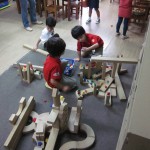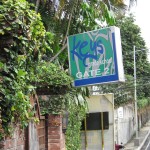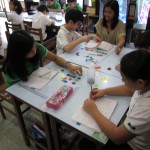 During my recent visit to the Philippines, I had the pleasure of visiting two exemplary schools that meet my definition of “best schools” as described in my book The Best Schools: How Human Development Research Should Inform Educational Practice. They were the Explorations Preschool and its sister school, the Keys Grade School, both in Mandaluyong, part of Metro Manila. These schools are united in their allegiance to principles based on those of the Bank Street School approach, which emphasizes a humanistic and developmental approach to learning.
During my recent visit to the Philippines, I had the pleasure of visiting two exemplary schools that meet my definition of “best schools” as described in my book The Best Schools: How Human Development Research Should Inform Educational Practice. They were the Explorations Preschool and its sister school, the Keys Grade School, both in Mandaluyong, part of Metro Manila. These schools are united in their allegiance to principles based on those of the Bank Street School approach, which emphasizes a humanistic and developmental approach to learning.
This philosophy emphasizes the child’s engagement with the world based on his or her own personal interests and developmental needs. Bank Street School alumni Didi Manahan, the Directress of both schools, and Maricar Gustilo de Ocampo, a founding partner (and my wonderful host while I was in the Philippines), led me through the classrooms at both schools.
At the preschool, I witnessed students engaged in playing with blocks, pouring rice into containers of different volumes, free painting and drawing, reading together in small groups, and intently involved in other self-directed learning activities. What a refreshing sight to see after reading about all the preschools in the United States that are forcing kids to sit for long periods of time at tables filling out worksheets, taking formal reading and math lessons, and having fewer and fewer opportunities just to be a child!
 After visiting Explorations Preschool, we crossed the street and visted Keys Grade School, which serves students from ages six to thirteen. In one classroom, I observed children engaged in the Singapore Math method, an approach based upon the national curriculum of the Republic of Singapore, which places an emphasis on problem-solving, simple exposition of concepts, and an in-depth understanding of basic math skills.
After visiting Explorations Preschool, we crossed the street and visted Keys Grade School, which serves students from ages six to thirteen. In one classroom, I observed children engaged in the Singapore Math method, an approach based upon the national curriculum of the Republic of Singapore, which places an emphasis on problem-solving, simple exposition of concepts, and an in-depth understanding of basic math skills.
The kids were using manipulatives to explore a math problem involving people getting on and off a bus (the underlying concept being taught was the idea of remainders in long division).  Another classroom I visited was a sixth grade classroom where students were doing some dramatic play on the topic of the French Revolution. Students took on different roles, as royalty, nobility, peasantry, and so forth, while each one explicated his or her particular point of view with respect to conditions in late 18th century France.
Another classroom I visited was a sixth grade classroom where students were doing some dramatic play on the topic of the French Revolution. Students took on different roles, as royalty, nobility, peasantry, and so forth, while each one explicated his or her particular point of view with respect to conditions in late 18th century France.
Finally, I observed some 7th and 8th graders working on various self-initiated projects. I talked with five students who were working collaboratively on a writing musical composition, another student who was working on his own guitar composition, a student who was researching a critical review of a video game that interested him, and a student who was serving as a peer-reviewer of another students portfolio of work over the past several weeks.
What impressed me about this group was their intense focus, their willingness to talk about their projects, and their self-directed learning, where nobody was telling them what to do, how to do it, and when to do it. Throughout the school, there was an easy, relaxed attitude toward learning, where students were respected and trusted, where their minds were being stimulated, and where each student was fully engaged in the learning process. Again, I say, what a contrast with the authoritarian, teacher-controlled, test-ridden atmosphere that hovers over too many American grade school and middle school classrooms. I certainly want to thank all the personnel of the Explorations Preschool and Keys Grade School, for making my visit to their campuses such a memorable experience!
For information about my latest ideas about education reform, see my book If Einstein Ran the Schools: Revitalizing U.S. Education
This article was brought to you by Thomas Armstrong, Ph.D. and www.institute4learning.com.
Follow me on Twitter: @Dr_Armstrong



















